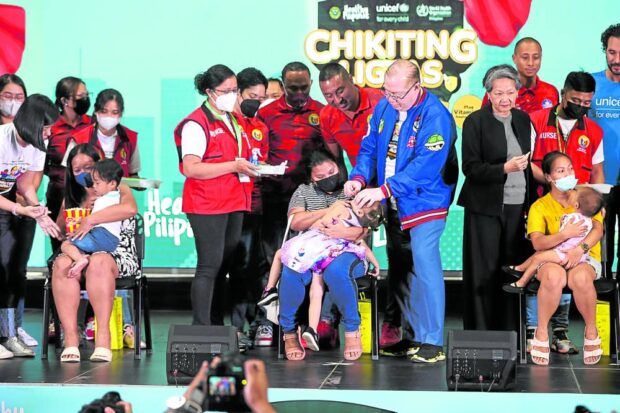DOH extends measles, polio vax drive

‘CHIKITING LIGTAS’ Small children are vaccinated against measles at the launch of the “Chikiting Ligtas (safe little ones)” immunization drive in San Juan City. INQUIRER/NIÑO JESUS ORBETA
The Department of Health (DOH) extended for another 15 days the national immunization activity for children as it has yet to reach targets for measles and polio vaccination.
In an advisory on Wednesday night (May 31), the DOH said the routine vaccination drive dubbed “Chikiting Ligtas” for kids under 5 years old would run until June 15.
As of May 30, more than 7.54 million kids, or 78 percent of the target, had been inoculated against measles in the monthlong drive.
READ: Over 8 million youths vaccinated against measles, polio — DOH
About 2.19 million children, or 68 percent of the target, had been vaccinated against polio.
Some 3.6 million kids had also received vitamin A supplements, according to the DOH.
The campaign aims to vaccinate 9.5 million kids nationwide against measles and rubella while another 11.1 million children are intended to be jabbed against polio.
READ: DOH youth vaccination drive: Over 3 million doses administered in first week
Health officials earlier noted that the Philippines has never reached the ideal 95-percent immunization coverage among Filipino children for vaccine-preventable diseases, hovering at only around 60 to 75 percent.
“There are many reasons on the ground why we couldn’t reach 95 percent. There were years that the challenge was more on delivery [of vaccines]. There were years that our challenge was more on the [lack of] human resources in the vaccination campaign,” Health Assistant Secretary Beverly Ho said in the campaign launch last month. The United Nations Children’s Fund (Unicef) Philippines, meanwhile, had said that unvaccinated babies and toddlers mostly come from disadvantaged communities.
READ: DOH launches nationwide immunization drive vs measles, rubella, polio
The country is among the 55 nations studied by Unicef to determine whether their public perception on the importance of vaccines shifted amid the COVID-19 health crisis.
Of the number, 52 of them, including the Philippines, were found to have waning confidence on routine immunization.